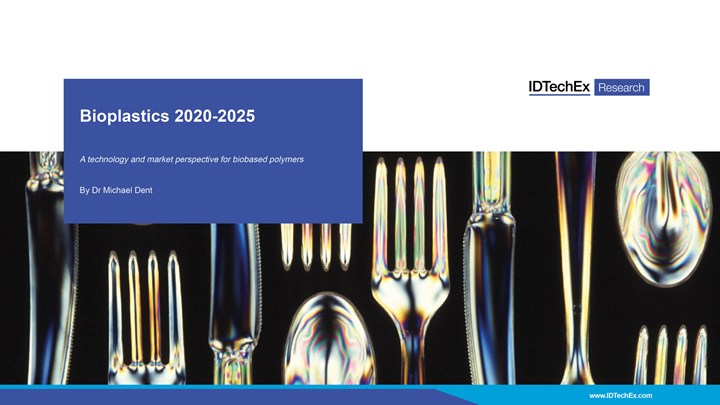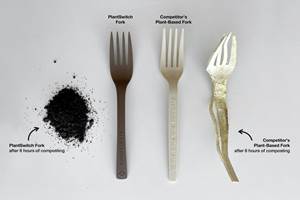IDTechEx Study Examines What Oil Price Crash Means for Bioplastics
IDTechEx’s new report explores emerging bioplastics technologies and forecasts the industry’s future over the next five years.
Within the last year, we have seen crude oil prices drop significantly which in turn has resulted in a drop in global large volume commodity resin prices. A recent report by U.K.-based market research firm IDTechEx (U.S. office in Boston, Mass.) examines what the oil price crash means for the bioplastics industry. According to IDTechEx, while bioplastics have historically struggled to deliver the same performance as fossil-based plastics, technology is increasingly closing the gap, creating highly functional plastics that ‘do not cost the Earth’. The report, “Bioplastics 2020-2025”, explores the emerging bioplastics technologies and forecasts the future of the industry over the next five years.
The report notes that bioplastic only have about a 0.5% market share of the global plastics industry, despite the clear environmental advantages. Even more worryingly for the bioplastics industry, this tiny market share has been fairly consistent for the last few years, meaning that bioplastics are not gaining ground on fossil-based plastics. This raises the question – why aren’t bioplastics growing faster?
The short answer is price. In general, consumers are willing to pay a bit extra for a green product, but only up to a point – the majority are happy to pay 5% extra for a green product, but this drops rapidly if the price difference grows any further. Unfortunately, bioplastics can be costly to produce and can only compete on price with fossil-based plastics if oil prices are high. Around seven years ago, oil prices were steadily growing, and the future looked bright for the bioplastics industry.

Then, in 2014, oil prices crashed, throwing the bioplastics industry into turmoil. In the following years, many major bioplastics companies went out of business or rebranded. After spending over $300 million on a bioplastics production plant, Metabolix abandoned the project, changing its name to Yield10 Bioscience and changing its focus to agritech. In January 2020, Italian PHA producer Bio-On was declared bankrupt, less than a year after having been valued at over $1 billion. CEO Marco Astorri was arrested in October 2019, following accusations of false accounting and market manipulation
Since 2014-2015, the bioplastics industry has struggled to get back on its feet. However, production has been steadily growing, as improvements in technology allow for cheaper production and an increasing global focus on sustainability makes bioplastics an increasingly attractive option for many governments. Companies, such as Corbion and Avantium, have been successfully developing partnerships with major food and beverage companies, with Avantium recently winning the support of Carlsberg and Coca-Cola for its plant-based bottle that the company claims can biodegrade in a year.
Sustainable tech company Anellotech recently announced construction of a plant capable of producing 40,000 tonnes per year of biologically derived aromatic compounds, valuable starting materials for bioplastic production. In 2016, Metabolic Explorer announced the construction of a plant able to produce 50,000 tonnes per year of biobased 1,3-propanediol, another important starting material in bioplastic production.
However, this gradual recovery of the bioplastics industry hit a major roadblock in spring 2020. The COVID-19 outbreak led to largescale reduction in demand for oil as the global industry was forced to slow down. This, alongside an escalating price war between major oil producers Russia and Saudi Arabia, led to a huge crash in global oil prices, with oil prices even briefly turning negative in certain US oil markets.
The crash in global oil prices threatens to suck the life out of the resurging bioplastics industry, creating a huge gulf in prices between bioplastics and fossil-based plastics. There is one bright side to the COVID-19 outbreak, however, demand for single-use packaging is increasing thanks to an increase in demand for food delivery packaging and retailers banning bring-you-own-container schemes to reduce the risk of the virus spreading. Whilst this growth in demand for plastics will be some comfort to the bioplastics industry (although probably not for the world’s oceans), the climate is still extremely worrying for the industry.
Major corporations such as Unilever and Coca-Cola appear to still be committing to the sustainable plastics pledges made over the last few years that have helped the bioplastics industry to survive since 2014-2015, and there are hopes that the industry can weather the storm until normality returns. Nevertheless, the next few months could be pivotal for the bioplastics industry, with many executives praying for a swift recovery from the COVID-19 outbreak and a resolution to the ongoing trade wars.
Related Content
PHA Compound Molded into “World’s First” Biodegradable Bottle Closures
Beyond Plastic and partners have created a certified biodegradable PHA compound that can be injection molded into 38-mm closures in a sub 6-second cycle from a multicavity hot runner tool.
Read MoreICIS Launches: Ask ICIS Generative AI Commodities Assistant
Said to be the first of its kind, this AI assistant will enhance access to ICIS’ intelligence and insights for the energy and chemical markets.
Read MoreNPE2024 Materials: Spotlight on Sustainability with Performance
Across the show, sustainability ruled in new materials technology, from polyolefins and engineering resins to biobased materials.
Read MoreAdvanced Biobased Materials Company PlantSwitch Gets Support for Commercialization
With participation from venture investment firm NexPoint Capital, PlantSwitch closes it $8M bridge financing round.
Read MoreRead Next
See Recyclers Close the Loop on Trade Show Production Scrap at NPE2024
A collaboration between show organizer PLASTICS, recycler CPR and size reduction experts WEIMA and Conair recovered and recycled all production scrap at NPE2024.
Read MoreFor PLASTICS' CEO Seaholm, NPE to Shine Light on Sustainability Successes
With advocacy, communication and sustainability as three main pillars, Seaholm leads a trade association to NPE that ‘is more active today than we have ever been.’
Read More
























